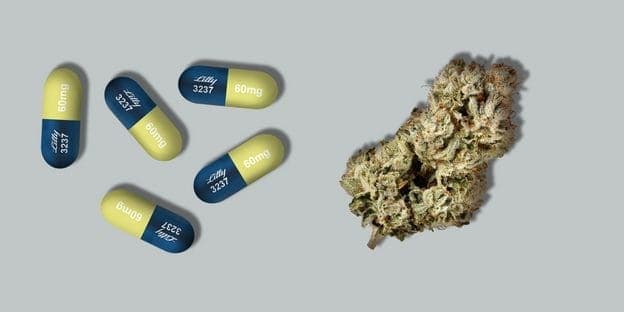Should You Use Marijuana If You Take Cymbalta?

Article written by

Shanti RyleContent Writer
Content reviewed by

Dr. Gavin MorelandMedical Director
Cymbalta is a prescription medication used to soothe several medical conditions, such as anxiety, depression and chronic pain. Many of these symptoms are among the approved uses for medical marijuana in legalized states.
While a sizable amount of research explores cannabis’ connection with psychiatric disorders, there’s little that examines antidepressants like Cymbalta’s interaction with marijuana. Some sources suggest that Cymbalta (duloxetine) has a moderate drug-drug interaction with cannabis, potentially interfering with its metabolization by the liver.
What Is Cymbalta?
Cymbalta — generically called duloxetine —‚ is one of the selective serotonin-norepinephrine reuptake inhibitors (SSNRIs) that increases the levels of serotonin and norepinephrine in the brain. These chemicals influence mood and pain sensations, and taking Cymbalta helps regulate them when their levels are imbalanced.
Side effects of Cymbalta range in severity and include:
- Aches
- Frequent urination
- Sweating
- Trouble sleeping
- Weight loss
- In extreme cases, muscle spasms and loss of bladder control
Uses and How It Works
SNRIs are a newer class of antidepressants that have shown a more promising ability to regulate mood without the traditional adverse effects of SSRIs like Prozac. Medications like Cymbalta work by modulating the neurotransmitters in the brain that communicate information between brain cells. By preventing the reuptake of serotonin and norepinephrine in the brain, Cymbalta can lift patients out of depression and soothe experiences of pain.
Potential Benefits and Risks of Mixing Cannabis and Cymbalta
Potential Benefits
We do not yet know if cannabis interacts with Cymbalta. Current research implicates marijuana as a promising aid to treat various conditions, including several disorders doctors prescribe Cymbalta to treat. As such, medical marijuana may offer an alternative for individuals who cannot or choose not to take SNRIs.
Evidence suggests that individuals who regularly use medical marijuana experience less depression. CBD, too, counteracts many of the adverse effects of THC’s psychoactivity, which could worsen anxiety with too high a dose. However, CBD is known to interact with many medications due to its impact on metabolic activity in the liver. Be sure to discuss using cannabis and Cymbalta with your doctor before making any changes to your medication routine.
CBG is another promising cannabinoid that could boost the antidepressant ability of Cymbalta. It works by preventing the reuptake of GABA, which contributes to a sense of peace and calm using a different neural pathway than SNRIs.
Potential Risks
While marijuana use and Cymbalta produce many of the same results, users should exercise caution before taking them simultaneously. Cannabis use with Cymbalta could impair cognitive and motor function, making it more difficult to focus or complete tasks.
Additionally, some of marijuana and Cymbalta’s side effects are similar, which could magnify these experiences if the drugs are taken in tandem. Both cannabis and Cymbalta display central nervous system (CNS) depressant properties, which can dangerously reduce heart rate and breathing when too much is taken.
The Bottom Line
There’s still much to learn about mixing cannabis with Cymbalta or other SRNIs; each person’s body handles drugs differently. Always discuss potential changes to your prescription routine with a medical professional before taking action, as a doctor should be able to answer most questions.
Leafwell’s dedicated team of medical professionals is here to guide you through applying for your MMJ card online.


